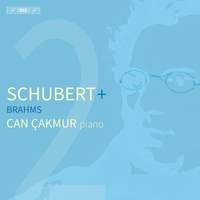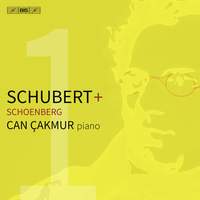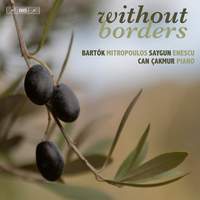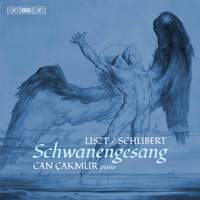Interview,
Can Çakmur on Schubert
Tomorrow evening he launches the 2024 competition in grand style with a recital at Kings Place which will see him joining forces with Chair of the Jury Noriko Ogawa for Beethoven’s arrangement of the Grosse Fuge for four hands before giving the UK premiere of his friend Fazıl Say’s New Life Sonata. Ahead of the concert, I spoke to Can about his Schubert + project on BIS (the second volume of which is now available to pre-order), falling under the composer's spell as a teenager, and why he's drawn such interpretative inspiration from pianists of the past who weren't strongly associated with Schubert's music..
In the booklet-note for this album, you describe Schubert's music as a 'constant companion in your life' - which piece was the gateway to that relationship?
I played simplified bits and pieces when I was small, but I didn’t take particular notice of him until I was thirteen. It was the second movement of the G major sonata that did it: it popped up on a playlist I had on in the background while I was doing homework and I thought ‘My god, this is amazing!’. That’s when I realised that there was more to this guy than my perception of him as someone who just wrote charming little pieces.
After that epiphany I started exploring the songs, mainly through the Fischer-Dieskau recordings, and because I didn’t have a sense of which were the important ones I just listened to everything! I think it’s great to have a blank slate like that when you’re discovering music, and it was a really nice introduction to the many faces of Schubert: some of the songs are charming, sure, but others are really dark and violent. I’ve never been professionally active as a song pianist, but during my studies I worked closely with singers nearly every week and Schubert lieder featured heavily.
Aside from Fischer-Dieskau, which other Schubert interpreters really spoke to you?
With Schubert's piano music there isn’t actually all that much choice when you think about it, which strikes me as a real pity. There are a lot of great names, but they’re all from a very similar background and you don’t have a variety of interpretations like you do in Chopin or Liszt. Our appreciation of Schubert is generally shaped by a single school, and I love that nowadays there are people who are finally challenging that.
Growing up I had all the usual stuff: the Brendel and Richter recordings, and a bit later Paul Lewis as well. But at some point you need to distance yourself from what has become too familiar, and the main impetus for that was when I discovered various pianists who are known primarily as Chopin players or Liszt players: Frederic Lamond, Ignaz Friedman, Moriz Rosenthal. Those guys played barely any Schubert at all (other than perhaps the Liszt song transcriptions), and their attitude to music spoke to me so much more directly than the 1960s/70s school.
The Schubert piano discography is so dominated by the post-War generation, with the notable exceptions of Eduard Erdmann and Artur Schnabel: I discovered their Schubert recordings much later, and they’re absolutely terrific. And more recently there’s Arcadi Volodos: he hasn’t recorded that much Schubert, but everything he has done is very interesting.

Tell me a little about how you're curating this series of recordings, and the decisions behind pairing Schubert with contrasting (or related) composers...
It serves a couple of purposes. Perhaps the most basic reason is just to keep your audience engaged: the feeling I got from live recitals was that if you play too much Schubert at one stretch then people drift away at some point, and I didn’t want that to happen with the recordings. I was keen to put together an hour of music that you can listen to uninterrupted: people might argue that that’s unnecessary in the age of streaming, but they can take it or leave it!
Another reason is that it’s quite demanding for me to work exclusively on a single composer for a long time: every composer has their characteristic turns and phrases which they use in a certain way, and potentially I think one can get into a style of playing which is very mannered if you don’t mix things up a bit. It keeps me entertained!
The third reason is that I felt that interspersing him with other composers perhaps helps Schubert’s music to make sense in unexpected ways - and I’ve found that happening with figures from the past as well as with composers who were inspired in new directions by his music…
On the new album I’ve coupled him with Brahms, who edited the Drei Klavierstücke D946: - and being such a curious musicological guy I’m pretty sure that Brahms took Schubert’s example in his own piano music. I don’t have any hard proof of that, but all those late piano pieces of his are very much in the same form that Schubert loves to use: for instance, there’s a very bohemian feel to the third piece of Op. 119 which puts me in mind of Schubert.
Much critical ink has been spilled over the decades about whether Schubert envisaged the Four Impromptus as stand-alone pieces or as a unified entity - where do you stand on that debate, or do you think it's a moot point?
I honestly think we could speculate about this for days and we wouldn’t be any closer to the truth! I think the idea that Schubert composed them as a cycle stems from a predominantly Romantic perspective, which could very well be true…but on the other hand we could look at it from a more Classical point of view and conclude that they were just put out there as a collection. If we want to make a connection between these pieces I think we’re more than welcome to do so, and we don’t need any kind of historical warranty to give us permission!
But I don’t personally see it as a kind of proto-sonata. The first time I listened to the master-tapes of the Impromptus I thought it all sounded pretty nice, but then I went back and said ‘Wait a minute, there’s no drama here!’. Initially I wondered whether we should rethink that and look for takes which are a bit more spicy and peppered, but when I went back to the score itself I realised that it’s unusually subdued for Schubert.
The other solo piano works he was writing around that time (like the sonatas he wrote just before the last three) are full of explosions and quasi-orchestral fortissimos, and these impromptus don’t really have that – if I’m not mistaken there are only eight bars of fortissimo in the entire set! So I decided it was better to approach them simply as a small collection of four brilliant-written pieces.
With Volume Two set for release in a couple of weeks' time, is it too early for me to ask you about the plans for Volume Three?
It’s going to be Krenek and Schubert, and it’s already recorded: I’ve just been listening to the master-tapes! Krenek was a real Schubert lover, and in fact he was the guy who introduced Schubert's music to Schoenberg; apparently Schoenberg said it was nice enough but he wasn’t particularly taken by it! Krenek, though, found the compositional procedure super-interesting: he thought that Schubert’s use of the principle of variation was incredibly smart, and he really took note of his music.
In 1921 Krenek took Schubert’s unfinished C major sonata and completed the third and fourth movements for Universal Edition - quite brilliantly, I think. (For 75 years that sonata was mistakenly believed to be Schubert’s last piece. The assumption was that he died while he was writing it, but he didn’t – it was just left incomplete for whatever reason!). Then a couple years later Krenek tried a couple of Schubert-inspired pieces of his own. In 1928 he took the traditional Schubertian principles of modulation and variation and applied them to the Piano Sonata No. 2: it’s quite charming, sitting somewhere between Schubert and 1920s Parisian jazz!
I’ve included two smaller pieces of Schubert on the album: the C minor Allegretto D915 and the Hungarian Melody D817 - plus of course Krenek’s sonata completion, which I don’t think had been recorded since 1945. In a way I understand why, and I don’t think I’ll ever play it in a concert: it’s incredibly difficult, but it’s really good music!
Do you have strong preferences about which type of piano you like to use for Schubert's music?
When it comes to concerts I’m super-unpicky: I’m very happy to try out different instruments. When it comes to recordings I always have my Shigeru Kawai, because I love the control that the instrument gives. It’s not particularly powerful, and it’s not a particularly ‘singing’ instrument in terms of the thickness of sound - but I think that a slightly thinner tone gives an extraordinary control and transparency. You can do things that you would never be able to do on this sort of the piano in terms of pedalling and articulation, and it allows for a very varied touch which isn’t always possible on a more meaty instrument.
How about instruments from Schubert's own time? Is that an avenue you've explored outside of the studio?
I’m quite familiar with the fortepiano, although I’ve yet to play it publicly: it teaches you to approach music in a different way. The fortepiano forces you to be quite free and liberal in aspects of pedalling, articulation and tempo, and I think that helped me to get away from the notion that Schubert is a person with a very steady pulse!
Your concert at Kings Place this weekend includes a new sonata by your compatriot Fazıl Say - how long have the two of you been on one another's radars?
Fazıl has known me since I was a teenager: he’s very invested in the next generation, and takes note of everybody who’s growing up in Turkey and trying to pursue a career in music. Funnily enough, he heard about me through his father, who lived in Ankara: we met when he came to one of my concerts when I was a teenager, and he became a bit of a family friend at the end of his life.
Fazıl’s been following my career ever since then, and over the last couple of years we’ve become very friendly. I really admire him as an artist and a composer: I recorded his piece Black Earth a couple of years back, and this season I wanted to play something else by him. He pointed me towards his three sonatas: the Troy Sonata is 45 minutes and very difficult to programme, then there’s the Gezi Sonata which was written in the aftermath of the 2013 protests, then this New Life Sonata which is still unpublished. Fazıl played it himself a couple of times last year, but the Kings Place concert will be the UK premiere.
It's a very nice piece: it’s written exclusively in irregular metres, which is something I absolutely love. It’s based around Macedonian, Bulgarian and Turkish music, which means you get a lot of threes and fours after each other, and that’s very effective. And it’s predominantly tonal: it’s mostly written in E major, but then he takes neighbouring notes and adds them to the chords. It’s not explicitly programmatic, but basically it’s about coming back to living life after the pandemic lockdowns. If you like the Troy Sonata, it’s the same kind of style!
Can Çakmur (piano)
Available Formats: SACD, MP3, FLAC, Hi-Res FLAC
Can Çakmur (piano)
Available Formats: SACD, MP3, FLAC, Hi-Res FLAC
Beethoven, Schubert, Haydn & Others: Piano Works
First Prize Winner Hamamatsu International Piano Competition 2018
Can Çakmur (piano)
Available Formats: CD, MP3, FLAC, Hi-Res FLAC
Can Çakmur (piano)
Available Formats: SACD, MP3, FLAC, Hi-Res FLAC
Can Çakmur (piano)
Available Formats: SACD, MP3, FLAC, Hi-Res FLAC








